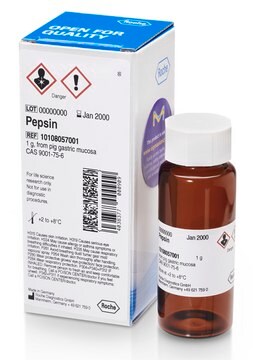1494057
USP
Pancreatin amylase and protease
United States Pharmacopeia (USP) Reference Standard
Synonym(s):
Pancreatin
About This Item
Recommended Products
grade
pharmaceutical primary standard
manufacturer/tradename
USP
application(s)
pharmaceutical (small molecule)
format
neat
Looking for similar products? Visit Product Comparison Guide
General description
Application
- Pancreatin for digestive enzyme research: Pancreatin, a mixture of digestive enzymes including amylase and protease, is extensively used in biochemical studies to understand digestive processes. It is pivotal in research focusing on enzyme mechanisms in the gastrointestinal tract and their role in nutrient absorption and digestion (Saruc et al., 2012).
- High-activity pancreatin for protein digestion studies: The potent activity of pancreatin′s proteolytic and amylolytic enzymes is utilized in scientific studies to dissect the pathways of protein and starch breakdown. This research is fundamental for developing improved therapeutic agents and understanding metabolic diseases linked to protein and carbohydrate metabolism (Gonçalvez et al., 1998).
- Pharmaceutical applications: In the pharmaceutical industry, pancreatin′s enzymes are applied in the formulation of medications that require precise digestive enzymes to activate or enhance drug delivery mechanisms, particularly in treatments targeting the digestive system (Friess et al., 1998).
Unit Definition
Analysis Note
Other Notes
signalword
Danger
hcodes
Hazard Classifications
Eye Irrit. 2 - Resp. Sens. 1 - Skin Irrit. 2 - Skin Sens. 1 - STOT SE 3
target_organs
Respiratory system
Storage Class
11 - Combustible Solids
wgk_germany
WGK 1
flash_point_f
Not applicable
flash_point_c
Not applicable
Certificates of Analysis (COA)
Search for Certificates of Analysis (COA) by entering the products Lot/Batch Number. Lot and Batch Numbers can be found on a product’s label following the words ‘Lot’ or ‘Batch’.
Already Own This Product?
Find documentation for the products that you have recently purchased in the Document Library.
Customers Also Viewed
Our team of scientists has experience in all areas of research including Life Science, Material Science, Chemical Synthesis, Chromatography, Analytical and many others.
Contact Technical Service








